Hands-on with the Seiko Fieldmaster a.k.a. Field Tuna

The Seiko Professional Specification or the PROSPEX has already made a mark in the professional world of deep sea diving. We know very well how deep a Seiko “Tuna” can go. But how does it fare on the land? Is there such a thing called a Land “Tuna”? Let’s find out.
The Marinemasters may be the most revered PROSPEX in the market due to its rich history and no nonsense approach. But as regards a jaw-dropping depth rating, it’s not entirely in the best interests of explorers of dry parts of the world. As such, the Fieldmaster was born.
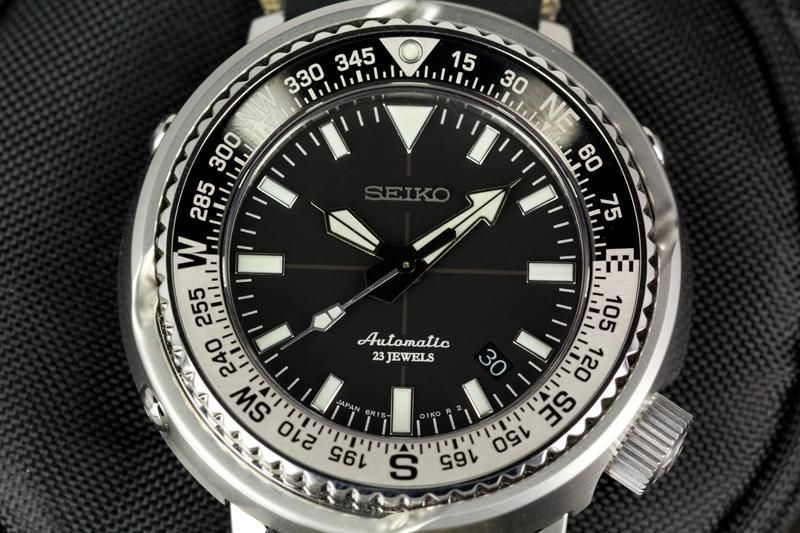
The Seiko Fieldmaster (SBDC011) or the “Field Tuna” as some would call it, is one of those automatic PROSPEX watches that is not build for the sea. Admittedly so, one couldn’t miss the fact that this piece is indeed a piece build around the “Tuna Can” case. Most particularly for folks who were acquainted with the Marinemaster Tuna, would easily notice the PROSPEX “Tuna” patented shroud around the case. Although the aesthetics of this piece screams “Tuna” all over, it’s actually nothing quite like it.
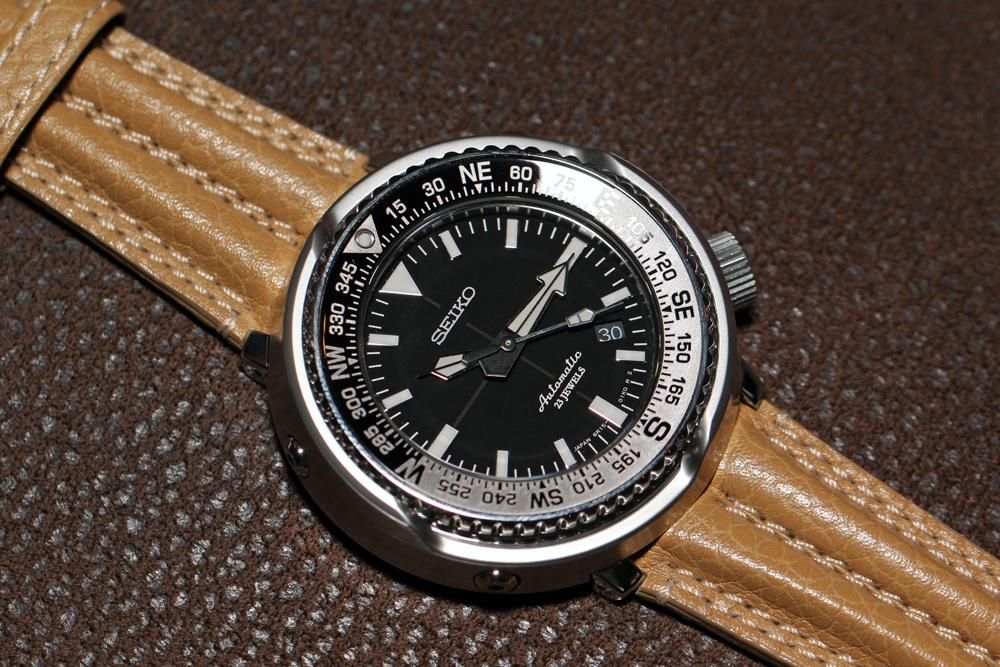
The first noticeable difference is the compass bezel. Although one could argue that any watch can be use as a compass, it does offer easier readings with a bi-directional smooth rotating bezel without the standard clicking sound you hear from a divers bezel, it is not a diver’s watch after all. The hands of the Field Tuna may be similar to the Marinemasters of Seiko, but the indices are far from similar. The date window is located at the 4 o’clock position rather than the industry norm of placing it in beside the 3 o’clock. Moreover, there are no labels of any kind in the bottom center of the dial. Texts such as the name of the piece and the depth rating are not shown, instead a simple yet elegant marking of a Seiko “Automatic 23 Jewels” is showed and written just above the 6 o’clock position, and need I say that the lume on this piece is stunningly bright.
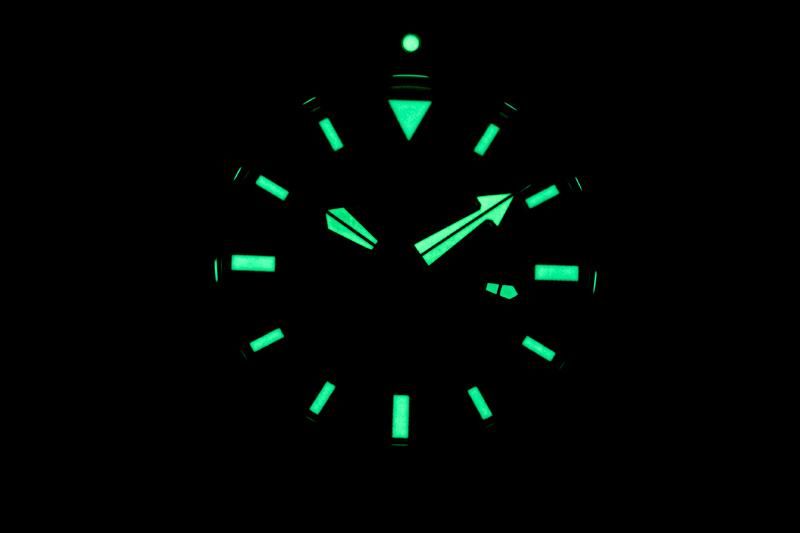
The case back features some handy descriptions and codes that are internationally recognized distress signals which is also known as Ground-to-Air visual signal code that can be used to convey messages to air crafts in search for rescue when there is no other means to communicate. It’s definitely a handy tool for explorers who are stuck in the middle of nowhere. For those interested in knowing more what these symbols are, you can check out the Wilderness Survival Guide.
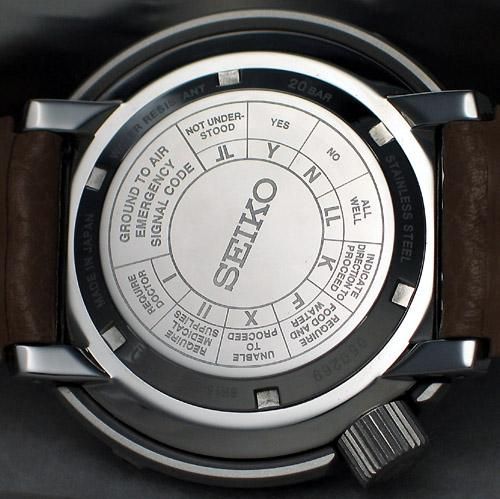
As mentioned earlier, the case is covered with the Seiko patented “Tuna” shroud but not the ceramic version. It’s fitted instead with a brush finished steel shroud that envelops the whole piece which I kind of like. It is also a surprise to see the same PROSPEX crown in the SBDX011 fitted into this piece. A relatively large screw down crown that allows easier winding with the large Seiko “S” symbol on it. The glass is Sapphire crystal for scratch resistance and is shown to have the bezel insert slanting downwards, for purposes of easier time readings and glare reduction.
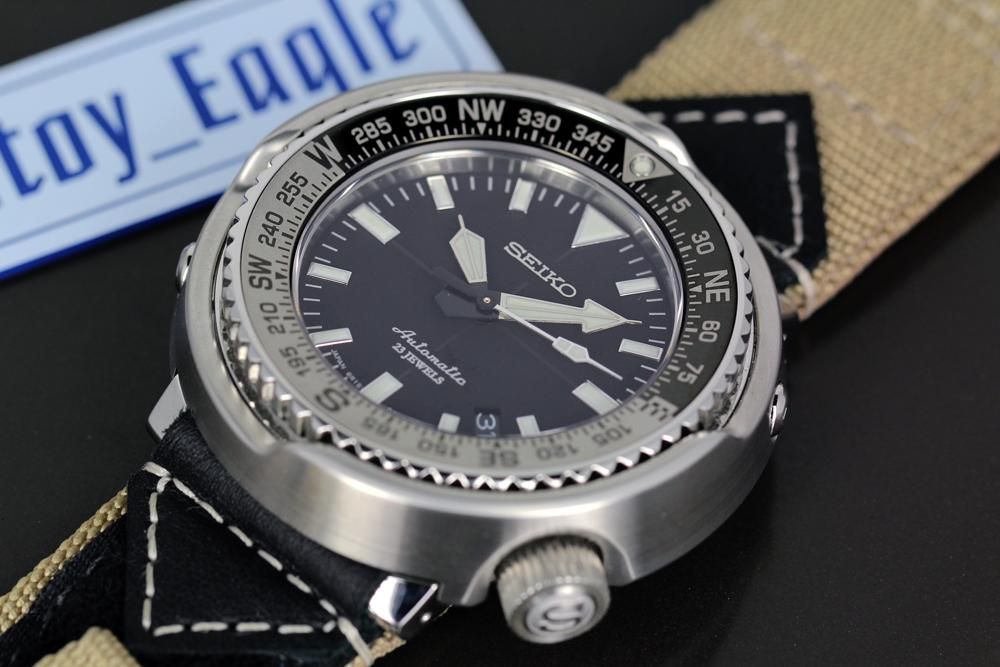
The addition of the PROSPEX shroud does indeed make the piece wear larger than most. The case itself is already huge, measuring at a diameter of 48mm (50.5mm with crown) and a thickness of 13.7mm, this piece is definitely a piece that wants to be noticed. Furthermore, the piece is also on the heavy end of the wristwatch spectrum as with all PROSPEX pieces, weighing in at 126 grams. All these specifications are basically made to make it so that this is a piece to be worn on the field. In fact, if you have been in the Seiko Watch circle long enough, the original Fieldmaster or more commonly known as the “Contra Watch” was actually a piece designed to be worn by Nicaraguan rebels. It’s an ultra-rare 1980s quartz collectible that the folks at Hodinkee have covered a few years back. Given such history, it’s no wonder where the compass and the coded caseback were inspired from.
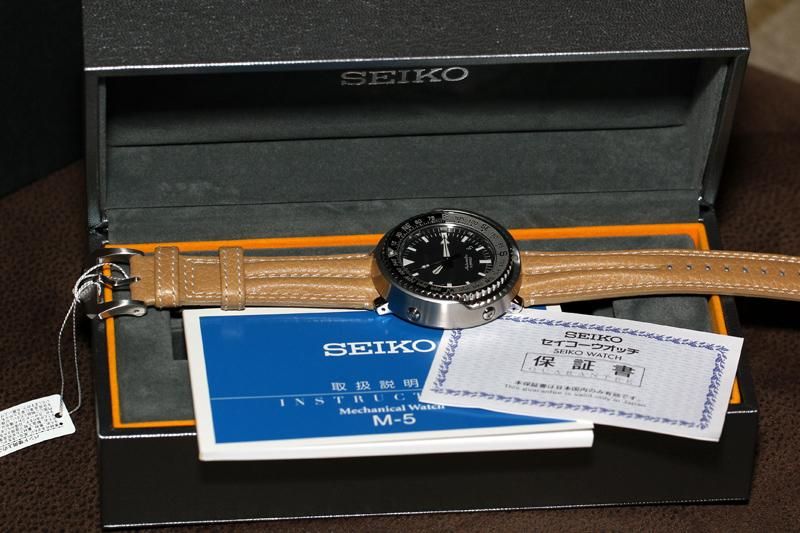
Of all the Seiko PROSPEX pieces, this is probably the first one to be fitted with a leather strap out of the box. It basically deviates from the standard strap choices of either stainless steel bracelet or the iconic rubber straps from the PROSPEX divers. It’s an odd choice for a tool-watch but nonetheless the leather strap offers a sporty feel to the entire piece. It may be so that the leather strap will not be pleasing to some folks, and it somehow is a hit or miss for PROSPEX collectors. Most folks I know who own one are either changing the straps to be worn with a steel bracelet, or a nylon strap, and of all straps I saw the “Field Tuna” was use with, the Bremont canvass strap fitted below is by far my favorite.
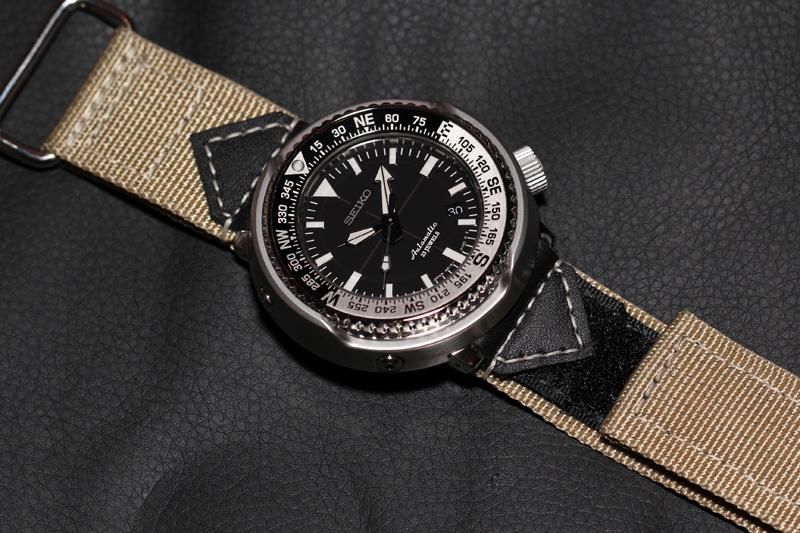
Here are a few wrist shots for good measure.
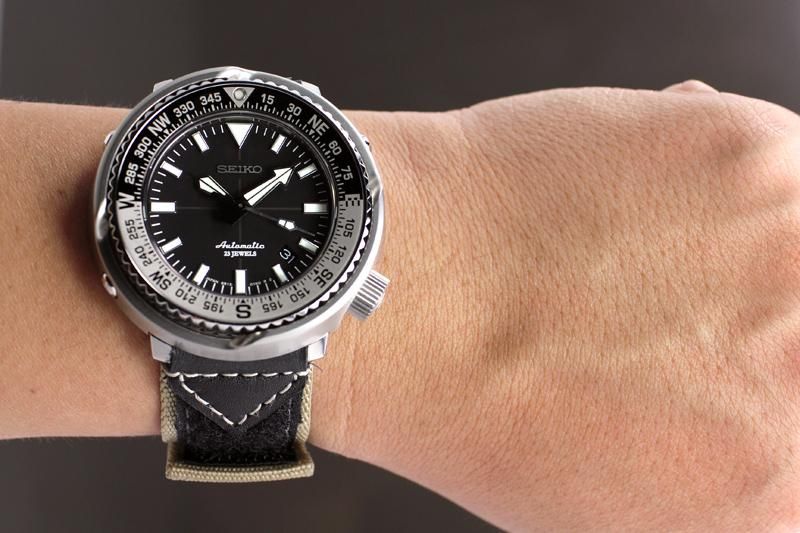
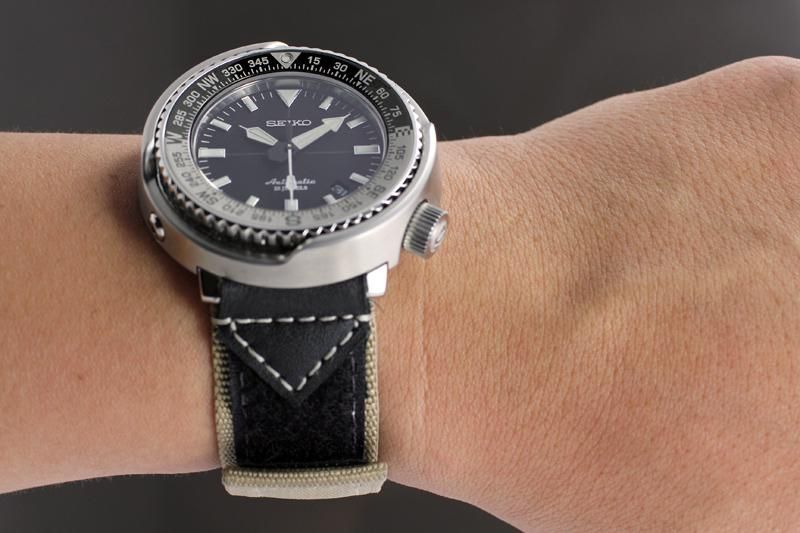
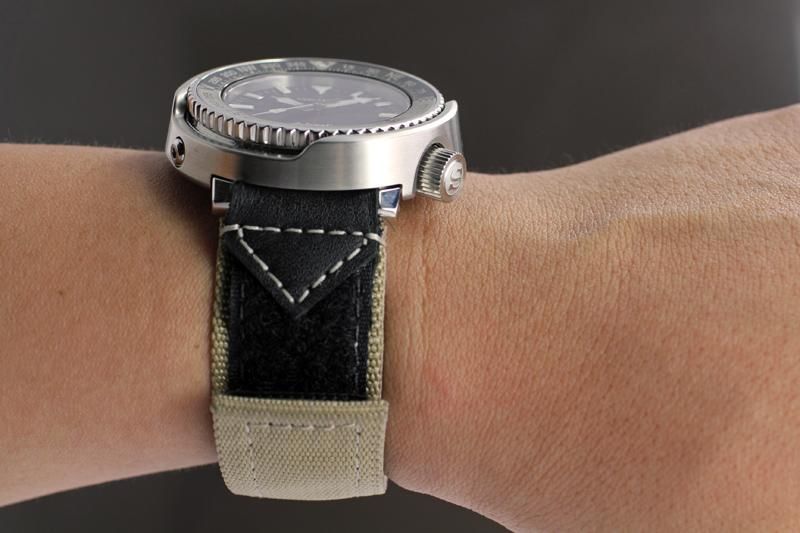
Movement wise, the “Field Tuna” is powered by a robust 6R15 caliber. A movement, which you find in the majority of the automatic pieces from the PROSPEX line. The 6R15 caliber is actually a movement that’s just a step below the top-notch 8L35 movement and an upgraded version of the 7S26. Essentially, it’s another undecorated piece of engineering marvel from Seiko. It’s one of the few movements from the Seiko mechanical movements that offer hacking and hand-winding mechanism, by simply adding a separate pinion on an existing movement to enable the winding without needing to recreate a new movement from scratch. It’s actually a redesign of the 7S26 caliber, but the wonders of adding a hacking capability and hand winding makes it a cut above the rest of the mechanical watches from Seiko. Some technical specifications of the Seiko Fieldmaster SBDC011 are shown below:
- Movement: 6R15 Caliber
- Drive System: Self-winding mechanical with manual winding
- Accuracy: + 25 seconds to -15 seconds daily
- Water Resistant: 20 bar
- Jewels: 23
- Weight: 126 g
- Dimensions: 48mm diameter x 13.7mm thickness
The Seiko Fieldmaster or the “Field Tuna” is without a doubt, a unique piece that shows its elegance from its no nonsense design. Even with the similarities with the Marinemasters, the Fieldmaster deserves a spotlight of its own. With current pricing of approximately 94,500 Yen (950 Euros) including taxes, the piece is considered to be a watch with good value. An affordable luxury tool-watch as some would say, and a very good one at that. Another gem from the Japanese-only made pieces that collectors around the world would want to grab a hold of. And just to make things more interesting, I am leaving you with a photo of the “Field Tuna” beside its limited edition hard-coated sibling.
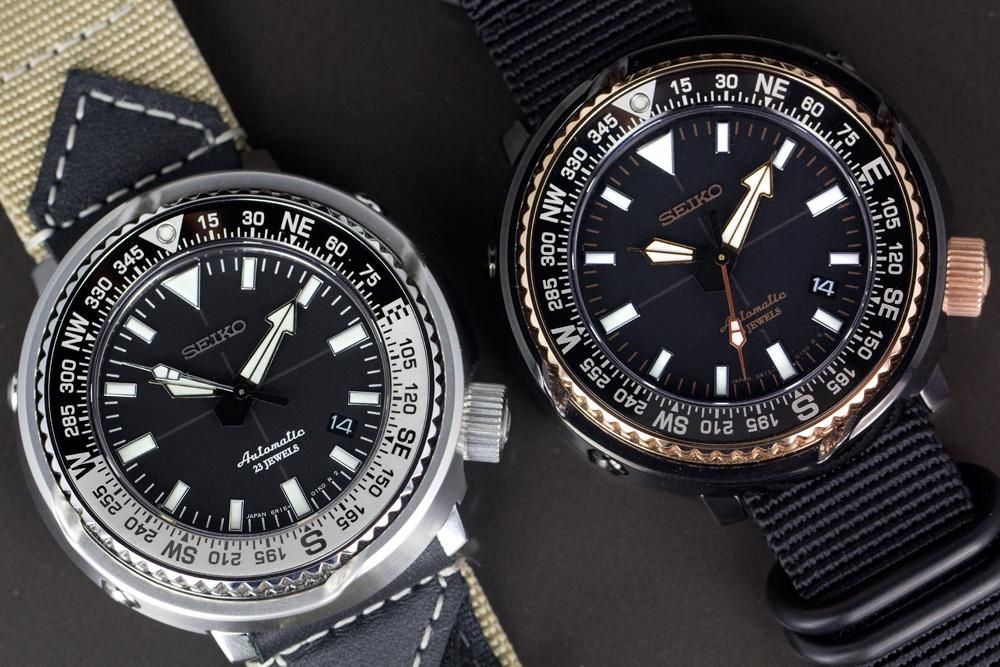
Special thanks to Ditoy Aguila from PhilippineWatchClub for sharing this piece and for the impressive photos of the “Field Tuna”.
This article is written by Evan Yeung, contributing writer for Monochrome Watches.




5 responses
Is that a real working compass?
Well it’s not really a true compass per se, not one that is magnetic and always points to the north, but rather a rotatable bezel that allows you to use the hands of the watch for navigation purposes.
yuck @ the 4 oclock date window
The Seiko Tuna looks good on almost any type of watch band. With rugged design and high quality, it’s worth every penny you pay for it. Interesting review!
Hey, I know that the SBDC011/35 are both discontinued nowadays so how much are they being flipped in the market?